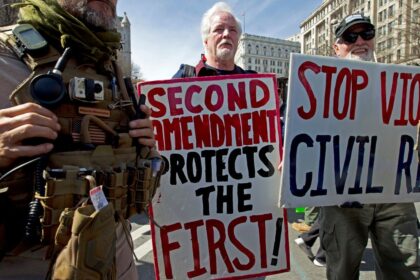
Title: Strengthening the Voice: The Need for Increased Gun Advocacy in the United States
In the United States, the right to bear arms has been a fundamental aspect of the nation’s identity since its inception. As the ongoing debate surrounding gun rights and regulations continues to shape public discourse, there is a growing need for increased gun advocacy. This advocacy is essential for preserving individual freedoms, fostering responsible gun ownership, and upholding the principles upon which the country was founded.
1. Preserving Individual Liberties:
The right to bear arms is enshrined in the Second Amendment of the U.S. Constitution, reflecting the Founding Fathers’ belief in the importance of an armed citizenry as a safeguard against tyranny. Advocates assert that this right is essential for preserving individual liberties, ensuring that law-abiding citizens have the means to protect themselves, their families, and their property.
2. Empowering Responsible Gun Owners:
Increased gun advocacy can empower responsible gun owners, encouraging them to engage in safe and lawful practices. Education and awareness programs supported by advocacy groups can promote responsible firearm usage, emphasizing the importance of proper training, secure storage, and adherence to local laws. By fostering a culture of responsibility, advocates contribute to safer communities.
3. Supporting Rural Communities:
In rural areas, where law enforcement response times can be lengthy, responsible gun ownership is often seen as a necessary means of self-defense. Advocacy efforts can address the unique needs of rural communities, ensuring that individuals in these areas have access to the tools they need to protect themselves effectively.
4. Fostering Informed Dialogue:
Increased advocacy can facilitate informed dialogue between policymakers, law enforcement, and citizens. By actively engaging in conversations about gun rights, advocates can provide valuable perspectives that contribute to well-rounded and evidence-based policymaking. Inclusive discussions are vital for finding common ground and creating effective, fair, and responsible regulations.
5. Safeguarding Against Overreach:
Advocacy plays a crucial role in safeguarding against potential government overreach. By actively participating in the political process, gun advocates can ensure that proposed legislation respects the rights of responsible gun owners and does not unduly infringe upon individual freedoms. Vigilant advocacy helps maintain the delicate balance between public safety and personal liberty.
6. Upholding Constitutional Values:
Increased gun advocacy serves to uphold the constitutional values upon which the United States was built. Advocates argue that any erosion of Second Amendment rights could set a precedent, potentially leading to the erosion of other constitutional liberties. By defending the right to bear arms, advocates actively preserve the broader framework of individual freedoms that defines the nation.
Conclusion:
In a nation founded on the principles of liberty and individual rights, increased gun advocacy is essential. By promoting responsible gun ownership, fostering informed dialogue, and safeguarding against potential overreach, advocates contribute to a society where the rights of law-abiding citizens are respected and protected. As the United States continues to grapple with the complexities of gun rights and regulations, an active and informed advocacy community is vital for preserving the balance between personal freedoms and public safety.



